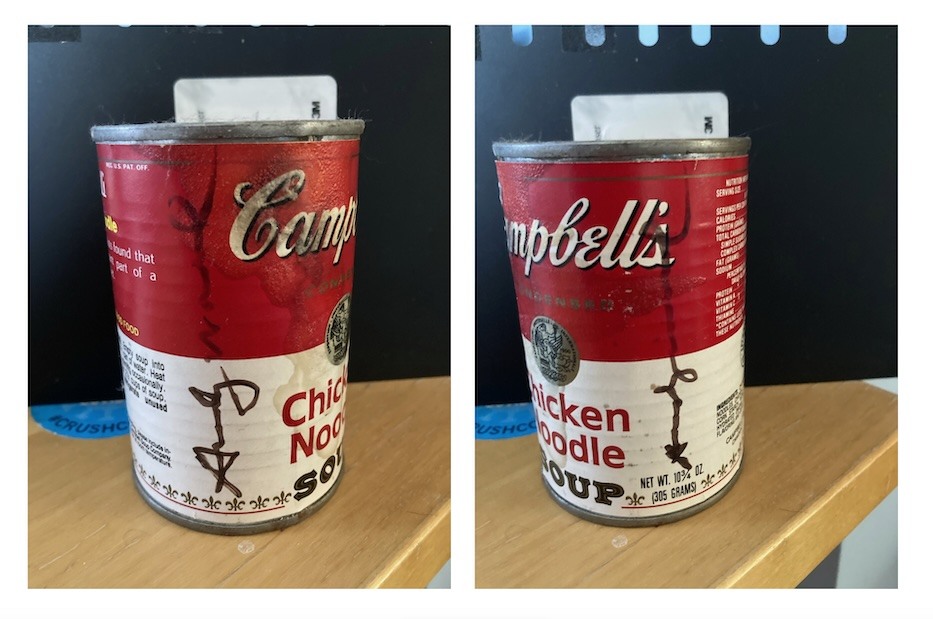
Arts & Culture | Visual Arts | History | North Haven

Sherill Baldwin Photos.
A twice-signed, once-discarded soup can has gained new life thanks to the discerning eye of a Connecticut-based authenticator and a cheerleader for environmental sustainability. Now, its sale into private hands is raising funds for a beloved local nonprofit.
That space is Ecoworks, the scrappy North Haven nonprofit, thrift shop and “reboutique” that gives discarded art supplies, buttons, old prints, used fabric, sewing kits, and similar bric-a-brac a second chance through creative reuse. Earlier this year, the shop's founder discovered that one such object—a can of Campbell’s Chicken Noodle Soup—bore pop artist Andy Warhol’s signature. Twice.
After authentication at the Danbury-based business University Archives, the can sold for $3,000 to a private bidder on March 12. The funds will support Ecoworks, which runs its North Haven storefront on a shoestring budget. It comes at a time when Warhol, who was famous for his depictions of the mass-produced red and white cans, is having something of a moment.
“It’s pretty cool!” said Ecoworks Founder Sherill Baldwin, who works for the Connecticut Department of Energy & Environmental Protection. “We’re used to getting weird, eclectic stuff … sometimes when you have these oddball things, you want to sell them outside the store because it supports the organization.”
“It’s transforming someone’s trash into literal treasure,” added Ecoworks co-founder and board chair Lisa Spetrini. “We have in the past gotten donations of ephemera and not known [what they were] and let things go for our thrift prices. We’re excited and delighted to have found a new source for being able to take these things.”
The story of the double-signed can—at least, its life in New Haven and North Haven—began around 2016, when someone dropped it off at Ecoworks in a box that also included bags of foreign coins and postcards dated to the 1960s and 1970s. Back then, Ecoworks was in its first storefront at 262 State St., nestled in New Haven’s Ninth Square neighborhood. Baldwin, who was still active with the organization, started sorting through it, and found the can buried at the bottom.
She didn’t know who had dropped it off: the nonprofit wasn’t particularly good at keeping itemized receipts or intake forms, she said. People who left things at the organization ranged (and still range) from art teachers on summer break to children cleaning out their aging parents’ homes. The coins dropped off with it, many from Europe, were now pieces of history, no longer usable after the introduction of the Euro in 2002. The postcards seemed like they might be of use to a teacher or collage artist working on a project.
But as the can came to Ecoworks still unopened (and likely full of coagulated, decades-old soup) something told her it was special enough to hold onto. She called Spetrini over to take a look, noting the jagged black signature that crawled up its side not once, but twice. “We kind of joked about ‘wouldn’t that be funny if it was real,’” she recalled in a recent phone call. They did a quick search on Ebay to see if there were cans that looked similar, briefly researched authentication, then put it on the back burner.
Stranger things have happened since, Spetrini said: Ecoworks recently sold three John James Audubon prints at around $18 each, because no one at the shop flagged them as potentially valuable. Spetrini later learned that they could have fetched closer to $1,800 a piece.
That’s where the can stayed for years, until it grabbed Baldwin’s attention anew last year. By then, the organization had moved to its second and current home, at 89 State St. in North Haven. Baldwin, who had left Ecoworks but kept the can (she still works for CT DEEP and is a steadfast champion of environmental sustainability), rediscovered it in her home. She’d had it there for safekeeping during the move, with a hunch that it still had value.
When it came up in a recent conversation with Aaron Goode—an environmental advocate, fierce defender of democracy, and history nerd himself—he referred her to University Archives, where founder John Reznikoff has been in business since he was a college student in 1978. She made the trip to Danbury, and Reznikoff authenticated it on the spot.
“I’ve spent my life studying signatures,” Reznikoff said in a phone call Monday. “I wouldn't say these are common. Warhol's signature is common, he signed a lot of prints and books.” But in 46 years on the job, “I've seen maybe five of these in my career.”
“It’s a classic signature,” he added. “You can see where the signature shakes a little bit where it hits the ribs of a can.”
Neither he nor Baldwin know the full backstory, but Reznikoff guessed that the double signature—part of what makes the object so cool—comes from a simple and deeply human impulse: Warhol may not have been happy with the first. When asked about the object’s new home by email, Reznikoff added that “it’s a private buyer, but hopefully one that will share it with the public and display it somewhere at some time in the future.”
Meanwhile, funds from the sale will help keep the lights on at Ecoworks. While “we’d have to sell a lot of soup cans” to meet current budget needs, every little bit helps, Spetrini said in a recent phone call. That’s especially true this year, as funding around environmental sustainability starts to tighten and dry up.
“Most of the time, we need to supplement our income with individual donations and grants,” Spetrini said. “In the current climate, that [funding] has shrunk for nonprofits and hit some of our community partners incredibly hard. So coming up with ways to strengthen our organization’s sustainability, this was a unique and interesting work around.”

